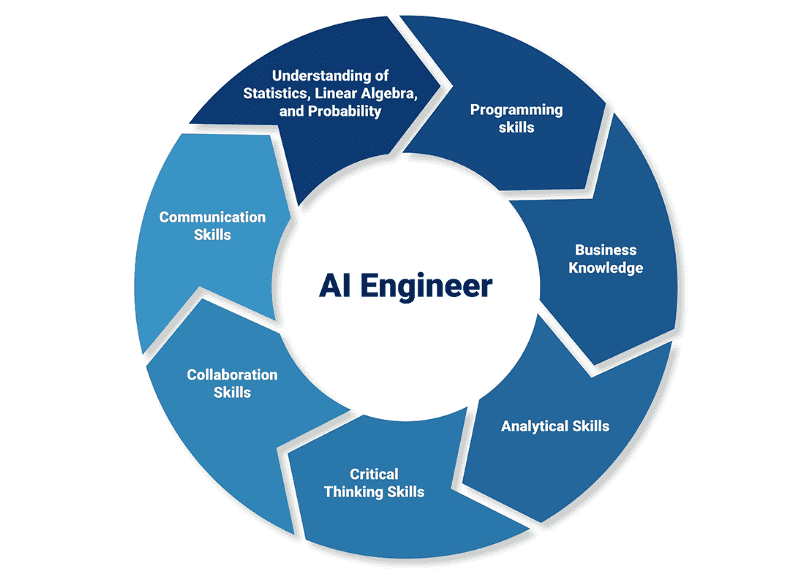Blog, Learning Guide
We live in a digital world where effective communication plays a crucial role in our daily lives. Whether it’s…
by WeCloudData
May 1, 2025
Blog
Artificial Intelligence has been popping up everywhere, and the demand for AI/ML engineer skills has skyrocketed. From Meta to Microsoft, companies across industries are racing to hire engineers who can build and scale cutting-edge solutions. Are you also interested in becoming an AI engineer but don’t know where to start? But what exactly are the skills required for AI engineers, and how do you show them on your AI skills for resume? In this blog, we’ll explore the AI skills in demand, including technical abilities and the soft skills employers want in AI engineers.
From finance to entertainment, e-commerce to transportation, AI engineers are in high demand across various sectors. According to industry reports, AI-related roles are growing faster than almost any other tech career path. For example, in the US, the U.S. The Bureau of Labor Statistics projected a 26% growth for computer and information research scientists (a category including AI roles) from 2023 to 2033. AI engineers are needed to:
It’s no surprise that AI engineering salary figures are highly competitive, with senior roles earning six figures and beyond. But to stand out, you’ll need more than just coding. Let’s dive into the seven most valuable AI skills in demand right now.

At the core of artificial intelligence skills required is nonetheless: machine learning. Employers want engineers who can design algorithms that solve real-world problems.
Here what to focus on:
WeCloudData’s AI Machine Learning program helps you build these AI skills for the future with hands-on projects.
Deep learning is one of the most in-demand AI/ML engineer skills. From autonomous vehicles to recommendation systems, it powers many innovations.
Key areas:
These skills answer the common question asked by employers e.g.: “What is the expertise of an AI engineer?” Deep learning is a big part of it. So you cannot miss it out.
If you’re still wondering “How to get skilled in AI?”, learning NLP can also be a great move. With LLMs like Chatgpt model’s GPT-4 transforming how we interact with technology, companies urgently need AI engineers who can employ them.
Core areas in NLP:
NLP is often what separates an AI developer (who may experiment with small models) from an AI engineer (who integrates advanced NLP into scalable systems). Explore what a course in NLP should look like here.
An AI model is only as good as the data it learns from. That’s why data engineering is one of the most underrated AI/ML engineer skills. Employers expect AI engineers to collaborate with or even take on parts of data engineering.
Skills to build:
By mastering these, you’ll show employers you understand the full AI lifecycle and not just model training.
Another major skill employers want: deploying AI at scale. Here’s where AI engineering salary often rises, since these are advanced, specialized skills.
Core tools:
With WCD: You’ll get hands-on experience deploying models on the cloud, crucial if you’ve ever wondered “Which AI skill pays the most?” (hint: MLOps is near the top). If AI Engineering seems overwhelming for you, you can only chose to focus on either getting training in MLOps or training in Cloud Engineering.
Beyond technical knowledge, soft skills employers want in AI engineers include communication and collaboration. AI engineers must explain models and align solutions with business goals.
Employers value:
Strong communication skills are needed to showcase the story you want to convey with your datasets so the end user can understand what you intend to relay so it’s more important than ever for clear communication.
At WeCloudData, we’re committed to helping aspiring professionals master the AI/ML engineer skills employers want most. Our programs are designed to bridge the gap between theory and practice, offering AI & Machine Learning bootcamps, data science course, data engineering training, NLP, MLOps track, and computer vision courses. With expert instructors and real-world projects, you’ll build the artificial intelligence skills required to stand out in today’s job market.
Whether you’re looking to boost your AI skills for a resume, increase your earning potential with in-demand tools like MLOps and cloud deployment, or explore the soft skills employers want in AI engineers, WeCloudData gives you the hands-on experience to succeed.
Ready to future-proof your career? Explore WeCloudData’s AI Engineer track today. If you are a company/enterprise leaning towards upskilling your employees in AI or any of your preferred technical skills do check our corporate training. In corporate training, we can help create flexible, customizable and tailored programs for your employees so the training is relevant to your use cases. Stay tuned for more updates.
1. What is the expertise of an AI engineer?
AI engineers are experts in building, deploying, and maintaining machine learning and deep learning systems, along with the pipelines and cloud infrastructure that support them.
2. What is the difference between an AI developer and AI engineer?
An AI developer may focus on building prototypes or coding models. An AI engineer goes further — designing end-to-end systems, integrating data pipelines, ensuring scalability, and deploying models to production.
3. Which AI skill pays the most?
MLOps and cloud deployment currently command the highest salaries, especially when combined with NLP and generative AI expertise.
4. How to get skilled in AI?
Start with Python and machine learning, then expand into deep learning, NLP, and data engineering. The fastest path is through hands-on experience, building projects, joining hackathons, or enrolling in structured programs like WeCloudData’s bootcamps.
"*" indicates required fields

WeCloudData is the leading data science and AI academy. Our blended learning courses have helped thousands of learners and many enterprises make successful leaps in their data journeys.
"*" indicates required fields
Canada:
180 Bloor St W #1003
Toronto, ON, Canada M5S 2V6
US:
16192 Coastal Hwy
Lewes, DE 19958, USA